Film Name: 星际探索 / Ad Astra
“Don’t watch a film on the computer if you can go to the cinema.” That’s a rule for me, especially with a film like Ad Astra: if I hadn’t seen it in a quiet cinema, I probably wouldn’t have been able to watch it ……
The film was generally well received by the critics, but not by the audience – after seeing the film I know what’s going on – it’s a literary film in the guise of a commercial sci-fi film, and it’s really not “commercial”.
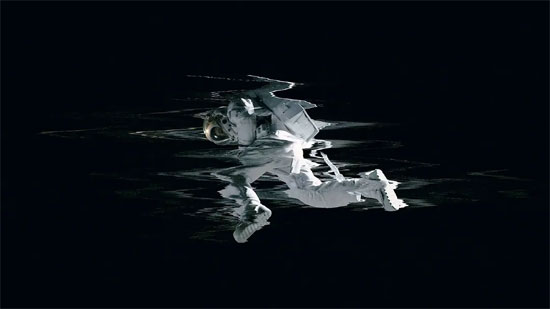
In my opinion, the tone of Ad Astra is “very sad and lonely”, from the character of the protagonist to the story plot to the spirit of the main theme, all of them are very difficult to make people happy, so to watch this film requires the audience to have empathy: if you can immerse yourself in it, you will be happy to do so; if you can’t get into the film, it will be dull and boring.
But I believe that in the future, more people will like and appreciate this film, because there are more and more lonely people.
[Friendly reminder: there will be spoilers below].
Since this is a sci-fi film, let’s start with the “sci-fi” aspect. Simply put, Ad Astra is not a success in terms of technical design and system construction, and does not leave much to be desired.
The film is set in the near-future, when mankind has moved further into the stars, building space ladders in the atmospheric dimension, freely sailing between the Earth and the Moon, establishing colonies on Mars, and exploring the fringes of the solar system as far as Neptune with the Lima spacecraft.
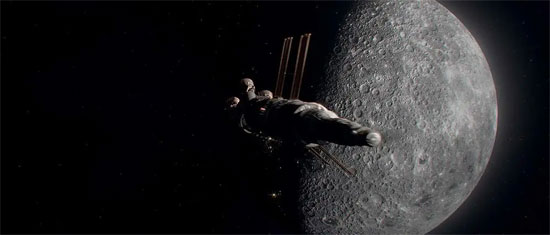
This is actually tens if not hundreds of years ahead of real-world space technology, yet almost all of the details presented in the film are simple rehashes of current space technology, and even the individual designs that look advanced and sophisticated seem a bit out of place in the environment.
Let’s talk about the power system, mankind is on the verge of achieving freedom of navigation in the solar system, but the carrier is still a rocket, and a 79-day + voyage from Mars to Neptune is not enough to convince people with the film’s spaceflight devices, built-in equipment and life-support systems.
It also seems contradictory and incongruous that the moon base has been “secularised” in an orderly fashion, while the outside of the base is still the barbaric “Wild West”. ……
Even I, as a non-specialist viewer, could notice these strange points, so I can imagine what Ad Astra would look like to those who know what they are talking about – it’s not really a “hard sci-fi” work.
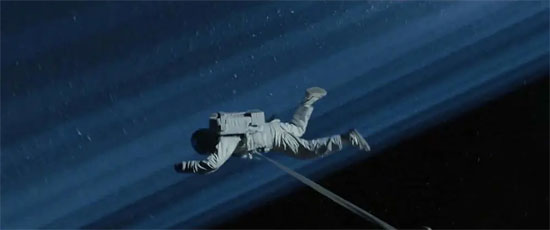
Of course, those aforementioned problems don’t prevent the film from showing the emptiness and vastness of the universe, as well as those gorgeous and moving scenes, such as the beautiful yet dangerous asteroid belt of Neptune.
In the end, the sci-fi setting of Ad Astra is just a shell used to facilitate the narrative and lyricism, and director Gray values the effect that can be attached to the stage and doesn’t care much about the design of the stage itself. …… Whether or not this is a minus depends on whether or not the viewer really pays attention to it or cares about it, so I won’t draw any conclusions here.
The real point of the film is the perceptions, states and emotions of the characters.
Ad Astra is Brad Pitt’s one-man show, and his portrayal of Roy sets the tone for the entire film, tugging at everyone’s nerves at all times.
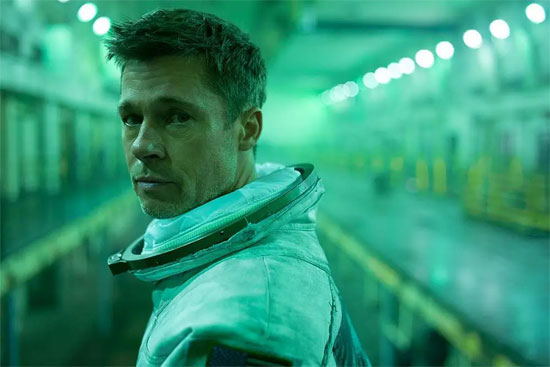
What kind of person is Roy McBride?
He was an aerospace engineer with outstanding mental qualities, cool, calm, and very difficult to produce mood swings from external influences, even when the space ladder was involved in a serious accident and fell from the atmosphere to the ground, his heart rate never exceeded 80; at the same time, Roy was also the son of the pioneering astronaut, Clifford McBride, who grew up and lived under the aura of heroes, he smiled at other people, but in his heart he always had no sadness or joy. No joy.
Don’t think Roy is cool or funny, but watch the film and you’ll see how dull he is, how he breaks up with his wife Eve, and how he has no family or friends around him, all because of this temperament, which can’t even be summed up by the word “autistic”.
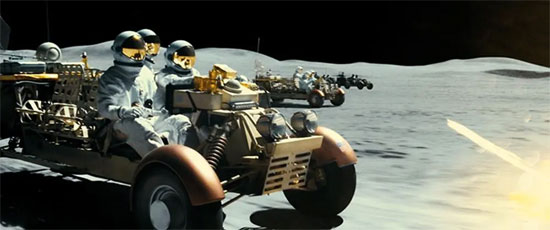
So Ad Astra is not destined to be a favourite, not only because of the aforementioned hardware shortcomings, but also because the main character’s persona is just too depressing to make even an understanding and empathetic audience happy.
In such an emotional and contextual situation, even the original “commercial sequences” that can be fun to watch will be tarnished: take Roy’s three crises from the moon to the Mars base, for example, when going to the launch base was attacked by the looters, the space rescue encountered a sneak attack by angry baboons, the acting captain of the ship before the landing of the stupidity of the loss of control, and each time it is a close call, almost killed! In each case, it was Roy’s unflappable, calm response that resolved the situation. Under normal circumstances, the survivors would have cheered, mourned, been scared, bragged, joked, etc., but Roy’s reaction? The same as before the encounter.
Roy seems to have lost his human emotions, he lacks emotions, and the audience has no place to put them and vent them …… How can this film be enjoyable to watch?
Thanks to this atmosphere, many of the film’s characters are pretty much this fucked up.
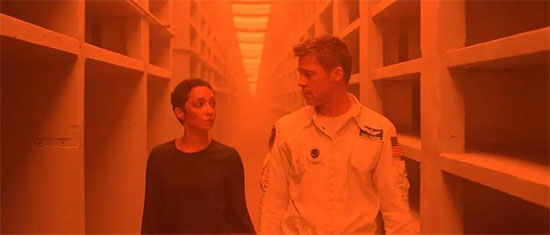
While the supporting characters in Ad Astra are a bit of a sideshow and don’t make much of an impression, Helen, who was born and raised on a Mars base, is one of the more “typical” ones: in a way, she’s a lot like Roy in that she doesn’t freak out, she doesn’t care about life and death, and she’s only interested in a handful of things, and she’s willing to risk universal condemnation to send Roy to the Cepheus for a chance to settle a grudge. She risked universal condemnation by sending Roy to the Cepheus. ……
I think this is the reason why the director chose the space sci-fi theme as the carrier of the story: the boundless, empty and lonely outer space of the universe infinitely magnifies the indifference and loneliness of the human heart, which is the core theme of the film.
Like Roy’s journey to Neptune alone on the Cepheus, the film is very “stream of consciousness”, accompanied by the infinite black space and the character’s tossing and turning, and the audience who watched the film can be completely absorbed in one shot.
Once the foundation is laid, the narrative is much easier to follow. We all experience Roy’s unsettling loneliness, but the story doesn’t stop at that.
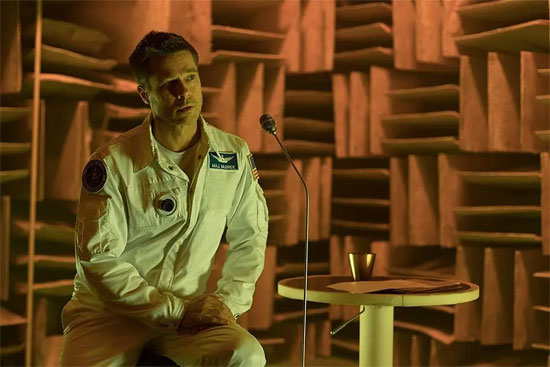
Roy’s temperament is largely inherited from his father, Clifford: both father and son like to be alone and have no one else in their hearts, and a job far away from Earth, deep in space, would be perfect for them, as it would fulfil their desire to live off the grid and have no one else to worry about.
But Roy’s problem also stems from his father – he’s used to his father ignoring him and his mother since he was a child. Therefore, when he learnt that his father might still be alive, Roy was very calm; when he kept sending official messages to the Lima at the Mars base, Roy was also very calm; but after he couldn’t help but say a few words to his father from his heart and got a reply from the other side, Roy got excited, and this was the only time he recorded that his heart rate increased and he failed the psychological test.
Human civilisation was built on creation and destruction, and human nature has always struggled with the oscillation between self-perpetuation and self-destruction, which is perhaps the root of Roy’s pain.
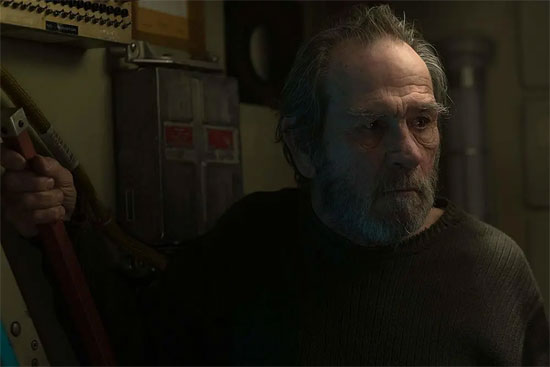
Before understanding Roy’s uncertainty and place, it is worthwhile to look at his father. Personally, I believe that Clifford is a true seeker of solitude, and that “exploring the unknown” is his most compelling reason for escaping the world, a mentality that is revealed when he stays in space at the risk of killing the rest of the crew.
But why does Clifford respond to Roy’s call? I can only explain it as he has not extinguished the last vestige of his attachments and bonds, he wants to pass on his experience and insights, and this statement does not change his original intention or bottom line, he would rather die outright in space than go back to that noisy human world.
Father and son are more than 90% similar (I think Clifford’s offer for Roy to stay is not that he wants the company of his son, but that he sees Roy and himself as one of a kind), but in the end, one goes left and the other right on different paths and has different endings.
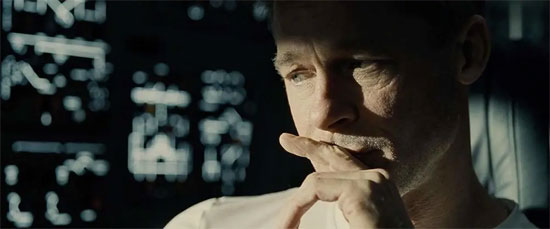
Roy is familiar with loneliness, accustomed to loneliness, longing for loneliness, but never completely give up to get rid of loneliness, he is like a weak and humble warrior, in the face of near doomed death, stumbling to defeat the enemy, bruised and battered back home.
Perhaps Ad Astra’s earlier atmosphere was so well created that I felt the film’s mournful, silent tragedy was better reflected by leaving Roy to die alone like his father at the end……. But who can blame the film for ending with a little more hope for the viewer?
No matter how cold the world is, it can’t stop people from chasing after warmth.
Please specify:Anime Phone Cases » Ad Astra 2019 Film Review: Are we escaping or pursuing solitude?